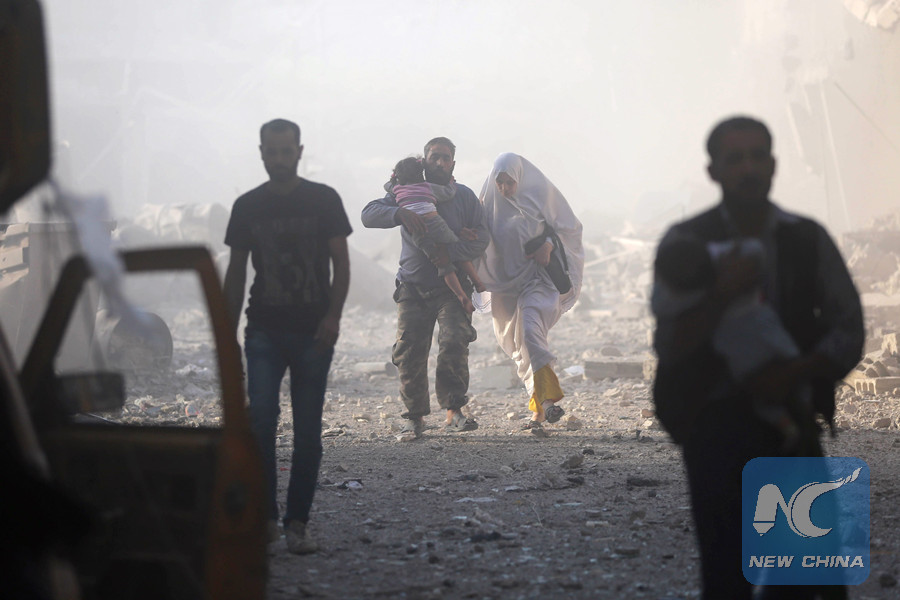
Syrians emerge from a dust cloud following a reported airstrike on Kafr Batna, in the rebel-held Eastern Ghouta area, on the outskirts of the capital Damascus, on September 30, 2016. (AFP/Xinhua)
DAMASCUS, Oct. 1 (Xinhua) -- A year has passed since Russia launched military operations in Syria against the radical rebel groups, in what was seen by Syrian analysts as an intervention that has saved Syria from fragmentation.
Unlike the U.S.-led intervention with the pretext of fighting the Islamic State (IS) group in Syria, the Russian intervention to support the Syrian government forces is seen to have helped shift the course of actions on ground in favor of the Syrian government army, which has been facing an array of ultra-radical groups for over five years.
Local analysts said the Russian air force intervention has protected Syria from division, especially that many plans to fragment Syria were put forward in the shape of a political solution.
The Kremlin said on Friday that the Russian military support played a role in preventing the downfall of the capital city of Damascus in the hands of the rebels, noting that there is no time-frame for the Russian military intervention.
"Neither the Islamic State, nor al-Qaida nor the Nusra Front is now sitting in Damascus," Dmitry Peskov, President Vladimir Putin's spokesman, said.
For his part, Syrian Information Minister Muhammad Ramez Turjman commented on the achievement of the Russian air force in Syria, saying "Syria is subject to an aggression targeting its unity and its presence as a unified state, and there are many foreign attempts to divide it."
Meanwhile, Sharif Shehadeh, a Syrian political analyst and former parliamentarian, told Xinhua that the Russian support has had positive results, noting that if it wasn't for the Russian intervention, the Syrian situation would have been so tragic.
"The Russian intervention has protected the Syrian government and prevented the fragmentation of the country, especially that countries like the United States want to prolong the crisis by supporting what they call as moderate rebels," he added.
The United States and other Western powers have from the beginning of the crisis been on the side of the rebels, with previous calls for the ouster of Syrian President Bashar al-Assad.
Turkey has always played a significant role in supporting the rebels and the ultra-radical jihadists, as the majorities of the foreign fighters and their arms have entered Syria through the Turkish borders.
Ankara repeatedly voiced its intention to impose a "safe zone" in northern Syria, which was also seen as an attempt to divide the country and make areas where the presence of the Syrian army is prohibited.
Ahead of the Russian intervention, the Syrian army was fighting solely against the foreign-backed rebels, with the foreign intervention of the U.S.-led anti-terror coalition helping all but for the Syrian army dislodge the rebels and restore control over the lost territories.
But the story has changed following the Russian support, as the Syrian army moved from the defense to the offense, capturing lost terrain in the northern province of Latakia, retaking the ancient city of Palmyra and repelling countless attacks by the rebels on key areas. The latest success is in Aleppo, where the Syrian army succeeded recently to advance against the rebels.
Osama Danura, another analyst, told Xinhua that the Russian intervention in Syria came to fight the terrorist groups that are posing threat to the entire world, not only Syria.
"Russia is fighting terrorists on behalf of the entire world and protected Damascus from falling as the rebels had controlled several key areas across the country ahead of the Russian interference," he added.
Aside from the areas that the Syrian army succeeded to take back with the help of the Russians, Danura also pointed to the reconciliations that have taken place in several areas near Damascus between the government forces and the rebels with the help of the Russians.
Buoyed by the Russian help, President Assad made it clear recently that the aim of the Syrian army is to restore every inch of Syria.

